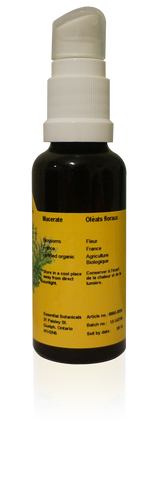What's in a label?
It’s easy to become overwhelmed by all of the information being given on a label;
What’s relevant? What’s true? What does it all mean?
The information on an essential oil label can tell you a lot about the oil's value, action and safe use practices; as long as that information is verifiable through a Third Party (in our case, Eco-Cert EU).
The following information should be provided to you on the label and be
Certified by a Third Party, so you can make a safe and informed decision about the oil you’re purchasing:
Botanical Name: The exact botanical name of a plant gives you very important information about the oil that you're buying. Case in point: Lavender. Lavandula Angustifolia is twice the value of Lavandula Latifolia. As a consumer, you should be aware of the value of the actual essential oil you're purchasing (this is listed on the front of our labels below the common name)
Part of Plant: What part of the plant was the oil extracted from? This is particularly important with certain oils. The oil extracted from one part of a plant can be much more valuable than the oil extracted from another part of the same plant. (in this case the part of plant is 'Blossom')
Place of Origin: What country was the plant grown in? This has a huge impact on the quality and biochemical composition of the oil. Where an oil comes from is also directly linked to its value i.e.; a French Lavender has a higher value than a USA Lavender. (in this case the place of origin is 'France')
Cultivation Method: How was this plant grown and harvested? It's important to know the farming methods used by the farmer who grew the plant that produced your oil - the integrity of an essential oil rests greatly on the cultivation method. The healthy development of the plant would be interfered with if the plant was not grown in its natural environment without the use of herbicides and pesticides (in this case the cultivation method is 'Certified Organic')
Batch Number: This number has followed the product from the farmer planting the seed, to the facility extracting the oil, to the company bottling and labelling it. In our case, batch numbers are registered with Eco-Cert EU. Without a third party governing body such as this, there is no way of ensuring that the information being stated on the label is accurate. The batch number is your guarantee that every aspect of your oil's production process can be traced.
Sell by Date: Just like food, essential oils/carrier oils/hydrosols have expiration dates. It is important to know that the oil you're purchasing has not passed expiration and that you will be able to get your value from it before it expires.
Okay, so what about all the other stuff you see on labels? Words like 'Therapeutic Grade', '100% Pure', 'Vegan', 'Natural'...
These are not certification categories, they are just words. Kind of like when you see 'Made with love' on a label - it sounds really nice but we all know, no one actually measured out love and added it to the product!
